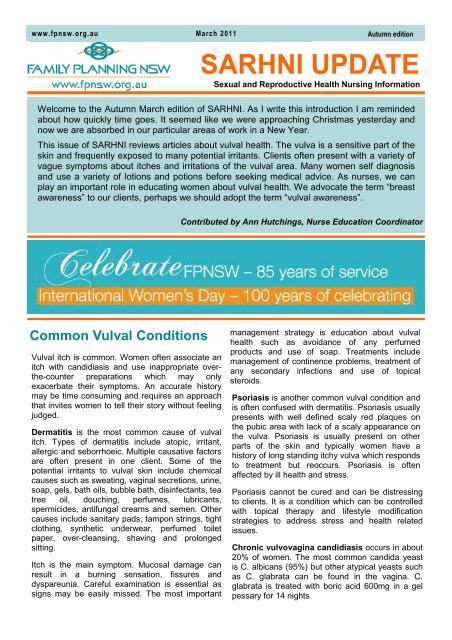SARHNI Autumn March 2011 - Family Planning NSW
SARHNI Autumn March 2011 - Family Planning NSW
SARHNI Autumn March 2011 - Family Planning NSW
You also want an ePaper? Increase the reach of your titles
YUMPU automatically turns print PDFs into web optimized ePapers that Google loves.
www.fpnsw.org.au <strong>March</strong> <strong>2011</strong><strong>Autumn</strong> edition<strong>SARHNI</strong> UPDATESexual and Reproductive Health Nursing InformationWelcome to the <strong>Autumn</strong> <strong>March</strong> edition of <strong>SARHNI</strong>. As I write this introduction I am remindedabout how quickly time goes. It seemed like we were approaching Christmas yesterday andnow we are absorbed in our particular areas of work in a New Year.This issue of <strong>SARHNI</strong> reviews articles about vulval health. The vulva is a sensitive part of theskin and frequently exposed to many potential irritants. Clients often present with a variety ofvague symptoms about itches and irritations of the vulval area. Many women self diagnosisand use a variety of lotions and potions before seeking medical advice. As nurses, we canplay an important role in educating women about vulval health. We advocate the term “breastawareness” to our clients, perhaps we should adopt the term “vulval awareness”.Contributed by Ann Hutchings, Nurse Education CoordinatorCommon Vulval ConditionsVulval itch is common. Women often associate anitch with candidiasis and use inappropriate overthe-counterpreparations which may onlyexacerbate their symptoms. An accurate historymay be time consuming and requires an approachthat invites women to tell their story without feelingjudged.Dermatitis is the most common cause of vulvalitch. Types of dermatitis include atopic, irritant,allergic and seborrhoeic. Multiple causative factorsare often present in one client. Some of thepotential irritants to vulval skin include chemicalcauses such as sweating, vaginal secretions, urine,soap, gels, bath oils, bubble bath, disinfectants, teatree oil, douching, perfumes, lubricants,spermicides, antifungal creams and semen. Othercauses include sanitary pads, tampon strings, tightclothing, synthetic underwear, perfumed toiletpaper, over-cleansing, shaving and prolongedsitting.Itch is the main symptom. Mucosal damage canresult in a burning sensation, fissures anddyspareunia. Careful examination is essential assigns may be easily missed. The most importantmanagement strategy is education about vulvalhealth such as avoidance of any perfumedproducts and use of soap. Treatments includemanagement of continence problems, treatment ofany secondary infections and use of topicalsteroids.Psoriasis is another common vulval condition andis often confused with dermatitis. Psoriasis usuallypresents with well defined scaly red plaques onthe pubic area with lack of a scaly appearance onthe vulva. Psoriasis is usually present on otherparts of the skin and typically women have ahistory of long standing itchy vulva which respondsto treatment but reoccurs. Psoriasis is oftenaffected by ill health and stress.Psoriasis cannot be cured and can be distressingto clients. It is a condition which can be controlledwith topical therapy and lifestyle modificationstrategies to address stress and health relatedissues.Chronic vulvovagina candidiasis occurs in about20% of women. The most common candida yeastis C. albicans (95%) but other atypical yeasts suchas C. glabrata can be found in the vagina. C.glabrata is treated with boric acid 600mg in a gelpessary for 14 nights.
Page 2<strong>March</strong> <strong>2011</strong>Women with chronic candidiasis are lessrecognised and not always well managed. Womenmay present with a history of recurrent acutecandidiasis which responds well to topicalantifungal treatment but over time the episodesbecome more frequent as they become resistantto topical therapy.Women may present without the typical “cheesy”discharge usually seen with acute thrush. Thepartner may have symptoms of post-coital itching(present in about 15% of cases). Women may givea history of worsening symptoms with the use ofpotent topical therapy. Ideally, a low vaginal swabis best but diagnosis of this condition can be verydifficult.HRT, uncontrolled diabetes, corticosteroidtreatment, antibiotic therapy andimmunosuppression are factors that areassociated with an increased predisposition to thiscondition, but the majority of women do not havethese factors.Treatment includes a trial of oral antifungaltherapy daily for a least one month. If symptomsare improving continue for at least 3 to 6 monthsor until the woman it totally asymptomatic.Lichen Sclerosus is a less common skin condition butone that nurses need to recognise and refer on to amedical officer. If left untreated, Lichen sclerosus maysignificantly deform the vulva which can lead to vulvalstenosis of the introitus. Importantly, there is a link tosquamous cell carcinoma of the vulva.The most common symptom is an itch which can besevere and ongoing. Excoriation and fissuring mayresult in dyspareunia. Lichen Sclerosus may beasymptomatic and noted by a clinician on presentationfor a Pap test.It appears as a well-defined white sclerotic plaque withan atrophic wrinkled surface. There are variations inpresentation including purpure, fissures, oedema andtelangiectasia (localised collection of distended bloodcapillary vessels).Lichen Sclerosus requires lifelong management withtopical corticosteroid and regular review.ReferencesFischer, G. Bradford, J. The Vulva, A Clinician’s PracticalHandbook, FP<strong>NSW</strong>.Sheary, B. Dayan, L. (2005). Recurrent vulvoaginalcandidiasis, Australian <strong>Family</strong> Physician, Vol. 34, No. 3,147-150.Welsh, B. Howard, A. Cook, K. (2004). Vulval itch, Australian<strong>Family</strong> Physician, Vol. 33, No. 7, 505-510Contributed by Ann Hutchings, Nurse EducationCoordinatorFemale Genital Cosmetic SurgeryIncreasingly, women are requesting changes totheir vaginas and vulvas for cosmetic reasons.Anecdotal information suggests the most commonreason women request genital cosmetic surgery isbecause of negative comments by a male partnerabout “not looking normal down there”. Women alsorequest vaginal cosmetic surgery to improve loosehanging labia (seen to be a sign of ageing) andtighten the vagina to enhance sexual function.Huggekinson and Hait first discussed genitalcosmetic surgery performed for aesthetic reasons in1984. Genital cosmetic surgery is a physical changeto correct an often “perceived” problem. Goodman(2009) argued that labial or vaginal surgery comesinto the same category as liposuction, rhinoplasty,breast augmentation and other cosmetic alterations.Some of the concerns about vaginal and vulvalsurgery raised by Goodman include absence ofscientific data on long term outcomes,psychosexual outcomes and safety information.Men’s knowledge about female genitalia oftencomes from pornographic magazines that airbrushthe vulva to meet publishing legislation. Men learnabout women’s anatomy from distorted, incorrectimages. Many women remove pubic hair by waxingor shaving providing a very clear view of labia andvulval anatomy. Male partners comment about theappearance of the vulva as abnormal which leadswomen to believe that they have a problem.As clinicians, we are in a privileged position todispel myths and correct misinformation aboutvulval anatomy. When performing Pap tests orexaminations of the vulval area, clinical commentsabout vulval anatomy are very important. “Yourvulva looks normal and healthy” can provide theopportunity for a client to openly discuss theirconcerns about the appearance of their vulva.Using photographs of normal female genitalia canbe a useful tool to include in your discussion.ReferenceGoodman, M. (2009). Female Cosmetic GenitalSurgery, Obstetrics & Gynecology, Vol. 113. No. 1.Contributed by Ann Hutchings, Nurse EducationCoordinatorFor your information, we are now postingour <strong>SARHNI</strong> Newsletter on our website(back issues from 2006 are available)
















